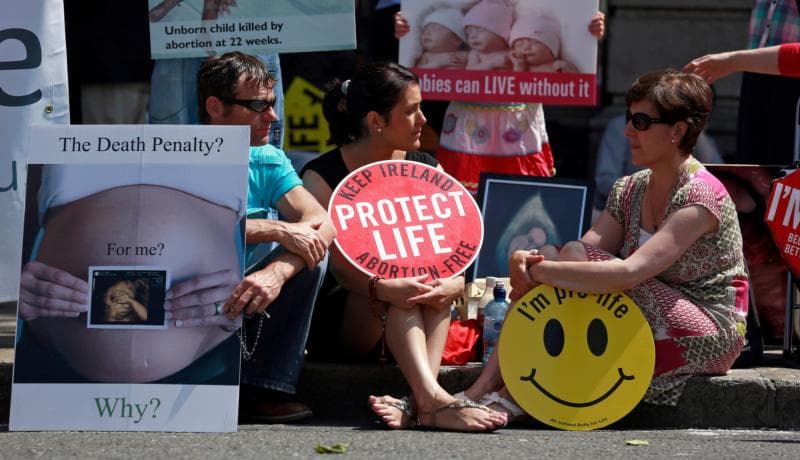LEICESTER, United Kingdom – If Ireland votes on May 25 to remove the constitutional provision of an equal right to life for the unborn, the experience of legalized abortion in other countries shows that it is “a straightforward matter for legislation to be liberalized further,” according to a report issued by Britain’s leading Catholic bioethics center.
The Oxford-based Anscombe Bioethics Centre issued its Briefing Paper a week before the Irish referendum on whether to remove the Irish Constitution’s Eighth Amendment, which was passed in 1983 and guarantees the right to life of the unborn.
“The aim of this briefing paper is to look at the evidence from Britain since the passing of the Abortion Act 1967, which can give us an idea of what might happen if Ireland were to repeal the 8th Amendment and introduce similar legislation,” said Michael Wee, the Education Officer at the Anscombe Bioethics Centre.
Wee told Crux the Irish government’s proposed abortion legislation incorporates elements of Britain’s abortion law, adding that “if there is any country that is culturally similar to Ireland, it is Britain.”
RELATED: Archbishop warns legalizing abortion ‘point of no return’ for Ireland
The briefing paper notes that abortion in England, Wales and Scotland rose steadily from 1968 to the mid-2000s, peaking in 2007 in England and Wales and in 2008 in Scotland. (Abortion is for the most part illegal in Northern Ireland; the laws in the UK-administered region would not be changed if Ireland legalizes abortion.)
“Since 2007/2008 abortion rates have fallen slightly, due primarily to declining pregnancy rates among teenagers. Nevertheless, the rate of abortion remains higher than at any time before 1998 and more than three times the figure for 1969 (the first full year of implementation of the 1967 Act). In 2016 there were 197,840 abortions carried out on residents in England, Wales and Scotland, the equivalent to 542 every day,” the briefing paper says.
Abortion is currently legal in England, Scotland, and Wales up to the 24th week of pregnancy on grounds of “physical or mental health” – this was lowered from 28 weeks in 1990. However, the law allows abortion at any stage of pregnancy on the grounds of risk that the child might be born with a disability.
“97 percent of abortions in Great Britain are performed under Ground C – that is, where there is a risk to the mother’s physical or mental health and the pregnancy has not exceeded 24 weeks. The number of abortions in Britain has seen an overall increase since the Abortion Act 1967 came into force, and it is now more than three times the figure in 1969,” Wee told Crux.
Wee points out the abortion legislation being proposed by the Irish government – if the referendum repeals the Eighth Amendment – includes a similar provision to Britain’s Ground C, but “additionally allows abortion up to 12 weeks on request, without any health reasons.”
RELATED: Irish pro-life campaigners criticize Google decision to ban campaign ads
Wee said that, currently, over 3,000 Irish residents seek abortions in England, and the Anscombe Bioethics Centre thinks that if the Irish government’s proposed bill becomes law, Ireland could see in excess of 10,000 further abortions each year.
Although the total number of abortions in England and Wales has fallen slightly since 2007, the number of abortion for reasons of disability has increased by 65 percent in the same period.
“This is a worrying trend, and it is possible that Ireland will follow a similar path if the 8th Amendment is repealed,” Wee said.
He told Crux that “risk to mental health” has been interpreted broadly in Britain.
“If Ireland adopts a similarly broad interpretation of ‘risk to mental health,’ this could see abortions for reason of disability permitted up to viability under the Irish government’s proposed law. The proposed law would also permit abortion up to birth for fetuses with life-limiting conditions,” Wee said.
The briefing paper says a convergence of abortion practice in Ireland towards that in England and Wales is also likely to see an increase in testing for Down’s syndrome and other congenital conditions, which could lead to women seeking abortion on the grounds of “mental health.”
“If ‘risk to health’ is interpreted in Ireland as broadly as it has been in England and Wales, then it would certainly give scope for abortion where there is a risk that the child, if born, would have a disability. The experience in England and Wales is that such tests are increasingly routine and that women experience pressure to undergo the tests and, if the tests show an increased risk of disability, experience pressure to terminate the pregnancy,” the paper says.
Anscombe states the experience of England and Wales is also that once abortion for disability prior to viability becomes established practice, then pressure grows to allow abortion for disability after viability.
The bioethics center said it is also likely that if the Irish referendum passes, and abortion becomes legal, then the interpretation of the conscientious objection clause for medical and healthcare personnel would follow a similar pattern as has occurred in Great Britain.
RELATED: UK bill seeks to protect conscientious objection for medical practitioners
In Britain, the scope of conscientious protection has been continuously narrowed, and is under pressure in professional guidelines and academic literature.
A 2016 report by the All Party Parliamentary Pro-Life Group found that some doctors and nurses have faced discrimination in their workplace due to their personal beliefs against certain procedures.
“It is not clear how far this undermining of conscientious objection has contributed to the increasing unwillingness of physicians to specialize in obstetrics and gynecology in England, Wales and Scotland, but it clearly does not help,” the report states.
“There is a shortage of obstetricians in Great Britain and few doctors are attracted to a career as an abortionist.”














